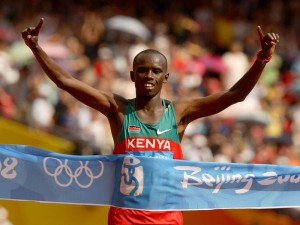(ThyBlackMan.com) I like to think that I have grown up over the years, but as a child, I fantasized about being an athlete. One of my most vivid childhood memories is a vision of Kareem Abdul-Jabbar sinking a long skyhook from the baseline to give the Milwaukee Bucks a victory over the Boston Celtics in game six of the 1974 NBA Finals. I was all of six-years-old when that ball went through the hoop but I was resolute that I too was destined for a life of playing ball.
Unfortunately, despite the many blessings I have received in life, height is not on the list. The same can be said for great strength and speed. Therefore playing ball beyond the neighborhood level was really out of the question.
However, I later discovered that while I could not run fast, I could run a  little longer than most of my peers. And while I would continue to enjoy the other sports immensely, I developed a special relationship with long-distance running both as a participant and spectator. That is why I am shocked and saddened over the death of Kenyan marathon superstar Sammy Wanjiru, who tragically died after falling from a balcony at his home in Nyahururu on May 15. He was 24 years old.
little longer than most of my peers. And while I would continue to enjoy the other sports immensely, I developed a special relationship with long-distance running both as a participant and spectator. That is why I am shocked and saddened over the death of Kenyan marathon superstar Sammy Wanjiru, who tragically died after falling from a balcony at his home in Nyahururu on May 15. He was 24 years old.
Sammy Wanjiru may not be a household name in the United States, but trust me he was a 100-percent, solid-gold superstar. His star status was not the product of endorsements and hype instead it was earned the old-fashioned way, through merit. This young brother excelled in a task that only a small percentage of the population will ever do—run a marathon—and he performed this task better than just about anyone who has ever accomplished this daunting feat at the highest level. The legendary Emil Zatopek summed up the calling of marathoners like this: “If you want to run, run a mile. If you want to experience a different life, run a marathon.”
In the hours before Wanjiru competed in the 2008 Olympic Marathon in Beijing, I participated in a 10-mile race in Flint, Mich. During the ride back, as my buddies rehashed their performances and how they fared in the age-group results, all I could think about was making it back to downtown Detroit, where I could watch the real race—the Olympic Marathon—uninterrupted on TV.
My original plan was to watch every step of the 26.2-mile race by myself, which would allow me to deeply concentrate and mentally run along with the competitors. However, my excitement soon overflowed and I had to call my dad so that he could enjoy the thrill with me over the phone. It was only fitting that dad be in on this, because dad encouraged me to run as a youngster, and more importantly, it was dad who taught me to love my brothers and sisters on the African continent.
Whenever I watch an international marathon, or distance event on the track, there is never a doubt that I will be pulling for the runners from African nations, and rarely do they disappoint, particularly our brothers representing Kenya and Ethiopia. Even before the gun went off to start the marathon in the heat and humidity of Beijing, I was confident that one of the African runners would outshine the field, and sure enough the day belonged to Wanjiru.
Despite the difficult weather conditions, despite the stiff competition from the other elite marathoners, and despite the American TV commentator we were listening to who said Wanjiru would not be able to maintain his blistering pace, the fearless, young Kenyan broke the Olympic Marathon record by more than three minutes, en route to becoming the first athlete from his country to win a gold medal in the event.
Dad and I burned up the phone lines that afternoon, as we gave our own descriptions of how the race was progressing. Afterwards we celebrated more than an athletic victory. We believed the courage and character the young Kenyan displayed in conquering the marathon distance and the other competitors, are the qualities possessed by all people of African descent and by calling upon these qualities we have the potential to solve our problems all over the world.
The beauty of sports is that we can find heroes anywhere—even on the other side of the world—and we can make these heroes represent anything we like. There is no denying the fantasy aspect of following sports heroes, but life has a way of busting up our fantasies. Learning of Wanjiru’s death and the personal issues that allegedly contributed to his demise, was indeed a powerful body blow absorbed by everyone who cheered for him—near or far. But just as we all cannot run 26.2 miles in less than two hours and six minutes, or sink the winning basket before thousands of screaming people, we can all relate to the difficult challenges that the game of life presents everyone. Sammy Wanjiru produced cheers and now tears. In the end, that probably made him more human than hero, and there is certainly nothing wrong with being human. Rest in peace, my brother.
Staff Writer; Scott Talley
This talented journalist is owner of a public relations firm; Scott Talley & Associates, Inc….

















Leave a Reply